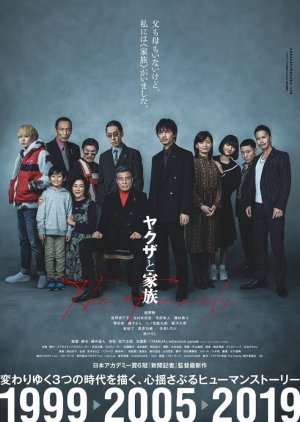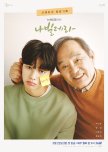
Deglamorizing criminal life
PlotWe follow the life of Yamamoto Kenji – young rebel whose life changes drastically when he meets the boss of Shibazaki-gumi and becomes a part of the yakuza family.
While the movie ticks off the fundamental elements and themes of yakuza movies, such as honour, family, crime, revenge, it doesn't shy away from showing the ugly truth about the often glamorized yakuza's life. We get to see the struggles that gang members have to face when trying to adapt to the changing times and the consequences of being a questionable part of the society. The passing years bring an inevitable reality check and the movie rises the question of what is a true family and if it's possible to escape from your past.
Acting
Ayano Go gives a solid performance and so does every actor who comes on screen. We get to observe raw emotion, people engulfed in rage or torn by remorse and despair, but also silent gestures, reactions that seem so real and so human.
Cinematography
The camera work grabbed my attention from the very beginning. The movements in chase and more violent scenes are more dynamic, the camera does not just simply follow, there are pans and tilts, it slows down or speeds up when needed. There are many really beautiful shots in this movie and the good use of lighting and colours creates certain moods and adds to the atmosphere.
Was this review helpful to you?

a must watch
you must watch it rn, don not hesitate just go and start watching,this movie describe the timeline of a guy that joins yakuza, and how the yakuza is fading out in the current days, but the main focus is on the relationships between yakuza family members, and the value of the family. it is very realistic so the ending was satisfying to me. this movie is one of those kind that going to fill your mind for days after watching it. there is enough dialog but at the same time it relied on acting to deliver what had to be said, and they delivered greatly, Ayano Go was brilliant i really was mesmerized by his facial expressions through the whole movie, the amount of emotions i felt is still with me right now as i am writing a day later.
Was this review helpful to you?

Also, a colleague dated a Yakuza guy briefly, but didn't find it threatening in anyway nor did she ever feel she was in danger. And unlike some things we had heard he had no missing finger. In saying that, another person I knew had a girlfriend from Europe go missing not long before her visa was about to expire - never to be found. She was working near a place called Rappongi as an escort so likely for the Yakuza (unorganised). She was an escort that served drinks and chatted nothing more - not anything R rated.
That was a really sad situation because her boyfriend (my friend) wouldn't give up and was persistent with the police about it for years and years, but just had no luck with them or finding her.
There are a number of missing foreigners in Japan - even murdered ones, like Lucie Blackman, only not all are mass media news stories or reported in anyway.
Anyhow, back to that nearby neighbour of mine, for some time I thought it was just an unfounded rumour about him because I only ever saw delivery drop offs every now and then when I passed by that way to and from work - nothing else.
You know the scene where one of the Yakuza guys wears sunglasses in that little restaurant and it is night time - I think it is a Yakuza thing. I was coming back from work late one night when I spotted a group of men all dressed in immaculate suits standing outside that neighbour's gates with about 3 -4 limousines (shaded windows) or Cadillacs. Expensive cars. Most were smoking and all wore sunglasses. I was literally crapping myself because they could have easily taken me if they wanted and made sure I was never seen again. I knew at that exact moment they definitely were Yakuza without a doubt. I was so nervous as there was no way I passed as Japanese so all I could do really was keep my head down, not say anything and quickly walk through them to get home and hopefully not gain too much unwanted attention. Not that they could miss me! I do recall some looked really young which surprised me. I did get a few cold hard stares I reckon because one turned in my direction and I could feel the intensity of being somewhere I probably shouldn't have been at that moment, but noone approached or hassled me. It was obvious something must have happened for them to be there so late and dressed like that - we (Japanese friends and I) worked out that there may have been a death among them, but who knows?! As the family name was on the gate near the mail box one friend looked for death notices under that name, but came up with zilch.
That is another thing - security cameras weren't so common in our area, but that place had them, also, he had a huge swimming pool which was uncommon as well. I don't think security cameras were so widely used back then when I think about it, but I could be wrong.
Guns weren't really an issue in Japan when I was there nor things like petty theft or mugging, but I didn't really work or live in bad areas if they did exist. I do remember mushrooms and other hardcore drugs starting to circulate only drugs really weren't so big back then either- they were obtainable, but not a massive problem like how we see it in Western countries.
This film touches on the years I lived in Japan if it starts in the late 1990s and onwards.
When I was there anyone with tattoos was banned from using the gyms and swimming pools because tattoos were associated with the Yakuza, also, believe it or not permed hair for some reason. Gangster hairstyle maybe.
I was told old Yakuza families belonged to organised crime and newer individuals belonged to unorganised crime - each different from the other.
Just wanted to share my experience because of this movie triggering certain memories even though what I saw or experienced with the Yakuza was just in passing whereas living in Japan was not.
Was this review helpful to you?
Yakuza Respect
Recommend the film, finished watching it now.Deep, heavy and meaningful story, I didn't know the yakuza suffered like that back in days, late in 90s till now, I think I knew nothing about them, I feel like I understand more about the yakuza life. Appreciate the hard work, I didn't skip any part.
The ending was unpredictable, how he did that to him, why to blame him, it's not his fault, I feel so bad for him, Yamamoto.
I think a lot of yakuza ppl suffered to be accepted, suffered to have a life, to be part of the community, imagine how awful their life was from seeing all who around yakuza members got abandoned just because they don't want to be mentioned as a friend of them, it's obvious when Yamamoto got out of ..... even him was surprised how everyone and everything had changed..
I remember that yakuza was the reason of Japanese ppl and Japan to be existed and strong like now...
atch it if you like reality and not the happy ending type .
I don't know why I still feel unease....
Was this review helpful to you?

This review may contain spoilers
classic and romantic, realistic and tragic
With a recurring sight of an industrial chimney amidst a coastal town, Michihito Fujii's movie about yakuza and family, aired first in 2020 in Taipei, offers us a nice view on Japanese society: both romanticized and realistic, with not-so-good characters but good technique.Starting concretely after an introductory first time period of more than 20 minutes of screen time (!), the movie offers a quite amusing, if not weird contrast for depicting yakuza. While they are pretty much shown as heroes in the second time period of the movie, carefree and admired by the population, they become total outcasts in the third time period. This evolution from a romanticized view to a realistic one feels a bit too astounding: I'd guess that Fujii wanted first to show the classic romantic view on yakuza in said second period to enter into the usual trope of the genre, before moving on to the newer realistic approach of its third phase — an understandable choice, that could have been more well performed nonetheless.
That being said, it is really for that third period that the movie shines. Recently, due to a series of laws passed in the 2010s, the yakuza world has been waning in Japan. Despite this, the world of art and entertainment still prefers to continue showing us badass and cool yakuzas. The view captured here by Fujii is not only realistic: it is also real at all. Today, being a yakuza is not fun, nor enjoyable, nor even a concretely possible life to lead: as one would stop being one, one would face strong ostracism for a rough 5 years, to the extent of losing one's friends, peers and even family, while struggling for even getting a cellphone. The Japanese society, highly cohesive, doesn't play around when it comes to dealing with outcasts. For that point, I found that the movie used very neatly the fact it was changing time periods: thus for the last one in 2019 that showcased the appearance of social networks and their astounding speed and strength for spreading quickly a small piece of information like a picture.
For that matter, the movie also shows some other interesting societal aspects. The most obvious is how the police is corrupted to the core and tied with the yakuza and their affairs: it's not by chance that the yakuza were so deeply rooted in Japanese society before. More interestingly, the movie asks the real question of how to deal with former criminals after they have served their prison sentence and their reintegration into society.
As its title shows by mentioning the word twice in Japanese and in English, the movie especially insists on the theme of family: its main character hasn't gotten the opportunity to grow within one, and has been longing for it — even if that were to be yakuzas, even if it would mean losing them quickly. As such, the movie shows that one can long for loved ones, be them related by blood or not, and that at all costs.
Sadly, Fujii's characters aren't so well written, nor is their development. Because of this, we don't clearly understand how Yuka fell in love with Kenji, nor how far Shibasaki played a father figure for Kenji. This lack of character development is a pity, because it would have elevated the movie a lot. Next to that though, Fujii tells his narration through clues and not just simple lines of text (like for Kenji's dad's fate), which is quite pleasant.
Otherwise, the movie uses interesting techniques throughout, most notably for the camera and the image. The camera's motion differs depending on the scene: it can as much shake (maybe too much though), reflecting Kenji's mind wandering, or being steady when it wants to engraves a scene. There was a very nice scene where the camera, literally a passenger in a car, was accompanying the viewer all along. As for the image, its overall aspect changes depending on the period, gradually becoming forlorn, darker in color and light as we move further in time.
Despite its flaws, I personally loved this movie, and would recommend it for its portrayal both romantic and realistic of yakuza, and of Japanese society as a whole. If it can fail to grasp the viewer's interest in its first segment, the tragical turn it takes in the second segment is striking and definitely worth watching.
Was this review helpful to you?

So many Half-baked Stories!
I didn't like 'Yakuza and The Family'. Maybe because it tries to cover too much, there are lots of half-baked stories that don't make sense. For example, both the guy's best friend and his woman_adults with decades of life experience_show extreme behaviours: one moment totally rejecting him and then immediately helping and accepting him into their lives; and then when things go wrong, leaving him alone and putting all the blame on him. What exactly did they expect?In any case, I wish he would talk to me after his prison time: I have a simple suggestion for him: Don't show up for 1 or 2 years, maybe travel to some distant city, but keep connection with friends and family. And then gradually coming back to normal and family life. I swear to God that I could guarantee a happy family life for the father, mother and the kid.
Last but not least, it was nice to see that Japan slowly but surely has reduced the Yakuza problem. This slow disappearance is the best!
Was this review helpful to you?








































